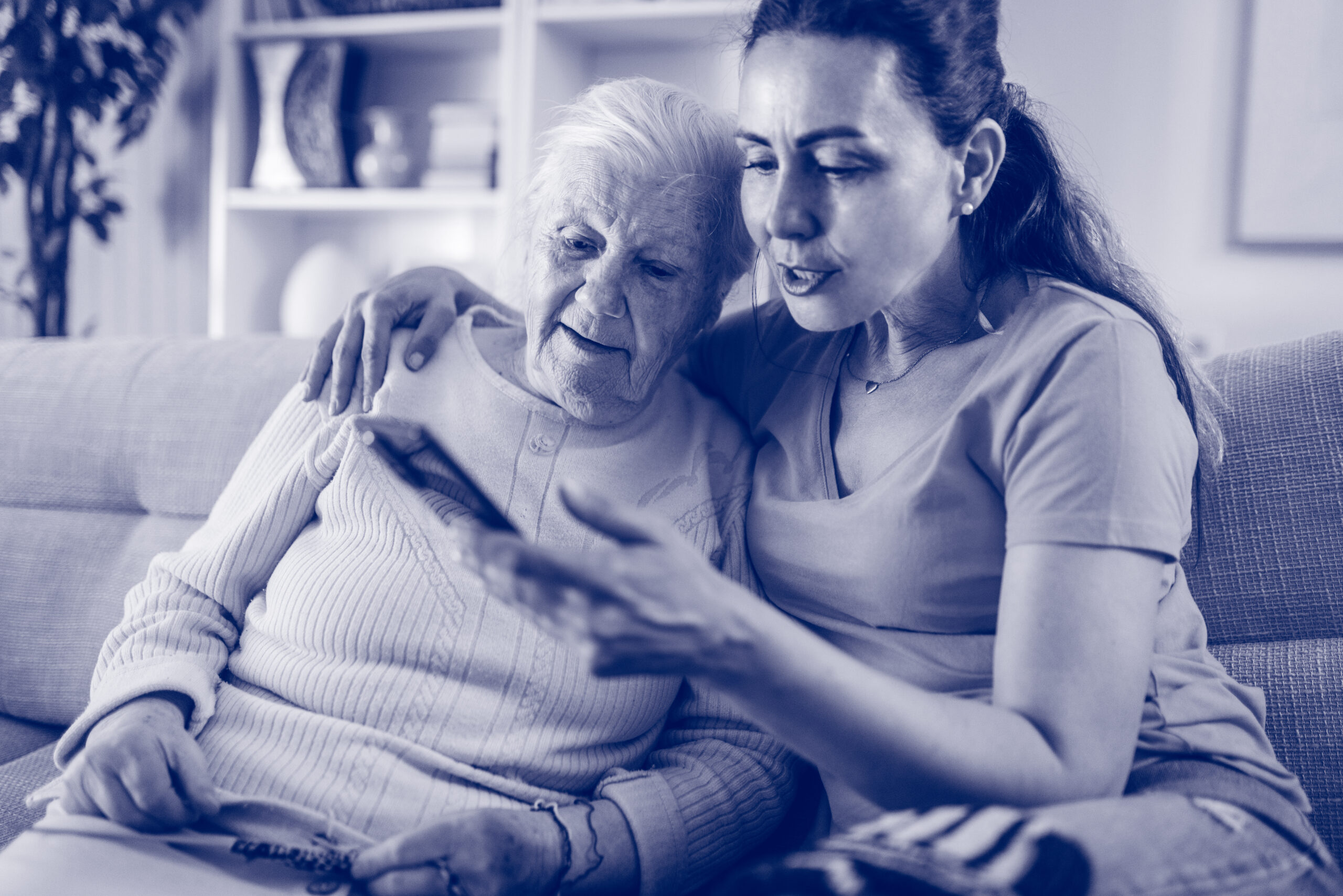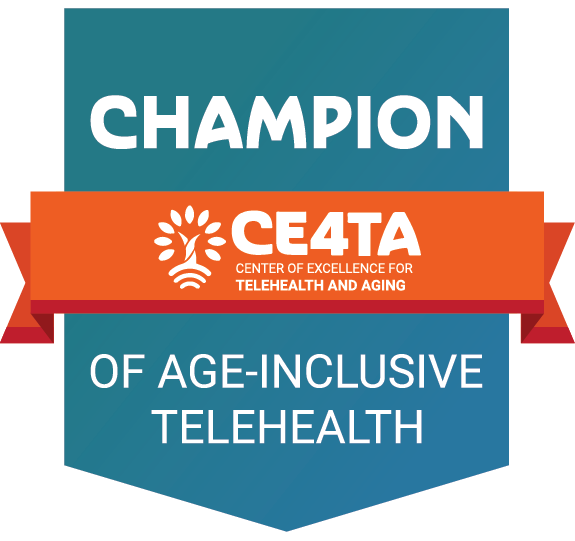Dementia Support Program
Covered by Medicare
For people with memory issues, there is truly no place like home. At Home Harmony offers Medicare’s GUIDE program, (Guiding an Improved Dementia Experience) that supports you and your loved one with free, at-home benefits to improve quality of life for the whole family.

What does free dementia care mean for your loved one?
- Personal Care Respite Voucher
Hours of paid 1:1 personal care, adult day center use, or overnight care for qualifying families.
Respite FAQs - Dedicated Nurses
and Dementia Experts
Our experienced team will help guide you through the complexities of dementia care.
Meet our team - 24/7 Hotline
Our dementia experts are available 24/7 to provide you peace of mind.
Who is Eligible?
Our Dementia Support Program is right for individuals who:
- Have dementia or suspected dementia (no diagnosis required)
- Have traditional Medicare Parts A and B
- Live at home or in senior living communities
Our Dementia Support Program is not available for individuals who:
- Are enrolled in a Medicare Advantage Plan
- Are enrolled in hospice or PACE
- Are long-term skilled nursing residents

9 Ways GUIDE Helps You and Your Loved One
-
Care Navigation:
You and your family need emotional support, knowledge, and practical advice to more confidently progress through the complex journey of dementia. Our experts make sure you have it.
-
Care Coordination:
Dementia doesn’t just affect the brain; it impacts every part of your loved one’s life. We coordinate personalized care to improve dignity, independence, and their ability to find joy in every day.
-
Personalized Patient & Caregiver Care Plans:
Your loved one needs a care plan as unique as they are. Our personalized care plans are tailored to your loved one’s specific needs, preferences, and stage of dementia for complete care that’s relevant and effective.
-
Home Safety Check:
Dementia can increase accident risks. It’s important to identify and address home hazards to ensure your loved one stays safe, giving you — and your loved one — more confidence in their independence.
-
Improved Outcomes:
Quality of life is important — for you, your loved one, and your entire family. We make it a priority. Our focus on physical, emotional, and social health significantly improves everyone’s level of well-being.
-
24/7 Hotline:
When you need help, you don’t want to have to wait for office hours. We’re available 24/7 to give you the help and peace of mind you need, especially in emergencies or moments of high stress.
-
Caregiver Education:
Knowing more about dementia empowers you to provide better care. We help you learn about dementia, its symptoms, and how it changes over time, to help you foster empathy and understanding, reduce frustration, and enhance every interaction.
-
Caregiver Support Groups:
Caregiving can be emotionally taxing. Our support groups are safe spaces to share feelings, frustrations, and experiences. The goal is developing coping strategies to better manage the demands of caregiving, and alleviate feelings of stress and isolation.
-
Respite Voucher:
If your loved one qualifies, the GUIDE program covers hours of personal care to be used in a way that supports you and your loved one.
What to Expect Once You Join
Welcome
We’ll get to know you and collect important medical and lifestyle information about your loved one. We’ll also schedule our first visit with your loved one. Depending on your location, this will be an in-person or telehealth appointment.
Caregiver Consultation
Our navigator will speak with you to review your loved one’s history, their unique experience with dementia, and your overall journey as a caregiver. We will also schedule a home safety evaluation. Our goal is to create a personalized plan to help your loved one thrive in a safe and comfortable environment.
Medicare Approval
Our care team will submit information to Medicare for approval and we’ll inform you of the status once it’s received. This process typically takes about 2 weeks.
Personalized Care Plan
Our dementia care navigator will create a personalized care plan and review it with you and your family. We’ll go through our safety review and make recommendations for improvements to help ensure your loved one stays safe in their home. And, finally, we’ll share details about GUIDE benefits, trainings, and support groups.
Respite Voucher
Based on the complexity of dementia, you may qualify for a voucher of personal care respite hours. We’ll help you determine how to use the voucher to best support you and your loved one.
Monthly Check-in
First, we’ll check in on the patient and the caregiver’s stress level. We encourage, problem solve, and listen. Second, we’ll be a trusted resource for recommendations to help you and your family keep your loved one safe, healthy, and comfortable in their home.

For Patients and Caregivers at Home
For people with memory and cognitive issues, there is truly no place like home. At Home Harmony is an approved provider of Medicare-covered dementia care. You’ll experience superior communication and improved quality of care. Take the next step for peace of mind as we help you navigate this journey.

For Senior Living Operators
Access a turnkey, standalone dementia program, improving outcomes for residents with memory impairments. Clinical staffing is offered at no cost to your community, and we work seamlessly with your existing care teams. Our model reduces staff burdens while caring for families and high-need residents.
Real Stories
Connecting with someone who has dementia can be incredibly challenging, especially when traditional forms of communication breakdown. By engaging with the individual living with dementia in their unique way, you may bridge that gap and provided a moment of joy and connection.
John has early onset dementia, he has lost his ability to communicate verbally and sometimes expresses himself physically, which may involve hitting, grabbing and pushing. His wife often feels fearful and misses their conversations. When the GUIDE navigator arrived, the wife shared that she felt there was no connection with him anymore. The navigator sat down and engaged with John in the nonsensical language he was using, filled with words like “dab,” “doop,” and “dop,” along with plenty of joyful emotion. The navigator shared several jokes to give him endorphin boosts, and to her delight, he laughed. The navigator ended the interaction by asking for a hug, and John hugged her arm. His wife was almost in tears, remarking how wonderful it was to see him connect with someone again.
The emotional responses elicited, through laughter and physical touch, likely not only boosted John’s mood but also reassured his wife that there is still a way to connect with him. It’s understandable that she feels fearful at times, but moments like this can offer hope and remind her of the person he still is beneath the challenges of dementia. Moments like this are why our GUIDE team is here.
Linda’s journey with dementia has been challenging for both her and her daughter, Susan. They signed her up for the GUIDE program with At Home Harmony and Susan she hoped it would bring some support and respite. During the safety assessment visit, Susan opened up about her feelings, expressing how much she missed connection they once shared. Instead of focusing solely on what Linda had lost, the navigator encouraged Susan to think about what Linda could still do. The navigator pulled out her phone and said, “Let’s dedicate a song to your mom.” She chose “Pretty Woman,” a classic that brought a spark of recognition. As the music played, the navigator playfully asked Linda to dance. Soon, Susan stepped in to dance alongside them. For those few minutes, they all danced and laughed together. After the song ended, the navigator explained to Susan that Linda still had abilities intact, particularly in her right temporal area, which is linked to music. The navigator emphasized that Linda was physically in good shape, making it possible for her to engage in activities that brought her happiness.That day, Susan saw that there were still opportunities for connection and joy. With the support of the GUIDE program, she felt hopeful about creating new moments with her mom.



